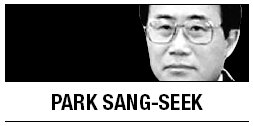[Park Sang-seek] Kim regime: Absolute monarchy or totalitarian regime?
By Korea HeraldPublished : Dec. 28, 2011 - 20:21
When I read a Korea Herald report on North Korean defectors’ reactions to Kim Jong-il’s death, it made me wonder how I would react to it if I were born and living in North Korea.
One defector says, “When Kim Il-sung died, we were bawling our eyes out and cried till our throats bled. But when I look at the videos of people crying now, there isn’t as much genuineness behind their tears.” Another defector says that there is a huge difference between the death of the two: “It’s like heaven and earth. Kim Il-sung was a god, and when a god dies, people can’t believe it so they are overcome with sadness.”

A Korean-Chinese living in Seoul told me that when Mao Zedong died, all Chinese cried as North Koreans did when Kim Il-sung died, but they acted when Deng Xiaoping died as North Koreans are now doing during the mourning period of Kim Jong-il’s death.
Two questions immediately come to mind: What made North Koreans so sad when they lost their leaders? Why did North Koreans cry as if a god died when the senior Kim died, while they are less sad in the face of the junior Kim’s death? It seems that Chinese reactions to the loss of their leaders provide a hint of the answer to this enigma: The Chinese and North Korean political systems are similar, and therefore their political systems made them behave in such a way.
Both Chinese and North Korean states are essentially totalitarian states. The main difference is that the Chinese system has become less totalitarian since Deng.
The totalitarian system has the following characteristics.
First, its society is completely politicized. In other words, there is no distinction between the state and society as in Western democracy. Under the system citizens do not enjoy privacy and fundamental freedom and are under constant surveillance by the state organs.
Second, there is no rule of law in the Western sense and the rule of terror prevails.
Third, the state monopolizes all means of violence and communications.
Fourth, one single ideology and elite rule are the foundation of the state machinery. Based on these twin principles, the state is ruled by one single leader supported by a single party composed of hard-core adherents.
The sources of legitimacy of a communist totalitarian state are the dictatorship of the proletariat and the charisma of the leader in contrast with the legal and traditional sources in other political systems.
In the case of North Korea the dictatorship of the proletariat was officially replaced by Juche ideology in 1972. The leader is feared and worshiped as the holder of absolute truth and the protector and savior of the people.
Finally, the state brainwashes the people through propaganda and indoctrination.
The whole system creates a totalitarian culture which in turn produces paranoia and herd mentality in the psyche of the masses. Of course, this is an ideal type of totalitarianism.
The North Korean system meets this definition of totalitarianism. But on a closer look, we find that the North Korean regime has some elements of a hereditary monarchy. It has the leader who is not selected by the elite group but inherits power from his father, as most monarchs do. Moreover, the legitimacy of the ruler is not only based on charisma but also on oriental authoritarian culture ― paternalism. Paternalism, which is conducive to Confucianism, is rooted in the long tradition of the historical Korean dynasties. In this regard, the North Korean regime is a hybrid of communist totalitarianism and the Korean dynastic tradition.
Now, we can see why the North Korean masses expressed such a sorrow and acted like a herd, while suppressing or hiding the fear of punishment (paranoia). Still, we have to find the answer to the second part of the defectors’ observations: Why did North Koreans grieve much more at the senior Kim’s death than at the junior Kim’s?
There can be two different views.
One is that North Koreans respected the senior Kim because he had greater charisma as the founding father of the DPRK and the bravest fighter against Japanese colonialism, and people enjoyed fairly decent living standards under his reign. In contrast, the junior Kim has had less charisma than his father because he did not earn his position but inherited it and people have suffered immensely under his military first principle and strong and prosperous nation doctrine.
Another view is that the totalitarian system is eroding because the Kim Jong-il regime has lost its iron grip on its people because of the wind of change has become strong due to the exposure of the masses to the outside world, particularly the rapidly developing China under an open market economy, the rapidly deteriorating economy, and the rampant and widespread corruption of the ruling elite. Under such conditions, people have become bolder and more rebellious. Some sharing this view even claim that the North Korean regime will eventually collapse by itself.
Nobody can confidently assert that one or the other view is correct. Moreover, no South Korean government agencies, including the presidential office, had been aware of Kim Jong-il’s death until the North Korean Central News Agency made an official announcement of his death.
Specialists on revolutions and conflicts generally agree that extreme income disparity is a necessary condition for a revolution or rebellion but not a sufficient condition and that a split within the ruling elite usually deals the final blow to a weakening regime. So far, nobody has got a smoking gun to prove that there is a split within the ruling elite in North Korea.
In this connection, we should reexamine the Korean-Chinese’s remarks mentioned at the outset: Why did Chinese respect Deng less than Mao despite the fact that under Deng they enjoyed more freedom and higher living standards?
In the Western mind, it is difficult to believe that humans can worship an autocrat regardless of whether he/she has charisma or whether he/she has defeated a more tyrannical regime. Such a view seems to be based on the belief that humans innately prefer individual freedom to tyranny or economic equality.
This view may be correct. But it should be remembered that an absolute majority of the North Koreans were born either during the Japanese colonial rule, which was basically a totalitarian rule, or under communist rule and therefore have never been exposed to Western democracy. In contrast, an absolute majority of South Koreans were born either during the Japanese rule or under civilian and military dictatorships and democracy. Thus, they have lived under three different political systems, but and have been exposed to Western democracy since Japan surrendered in 1945 ― even under the civilian and military dictatorships ― because South Korea has never been closed to the outside world and the civilian and military dictatorships were different from a totalitarian regime.
Considering the totalitarian and dynastic culture in North Korea, the best way to change it is to make more patient and comprehensive efforts to open up North Korean society through soft power to expose North Koreans to the outside world, using every electronic device and other means.
When they become more sober in the face of the death of their ruler, there will be hope for reunification.
By Park Sang-seek
Park Sang-seek is a professor at the Graduate Institute of Peace Studies, Kyung Hee University. ― Ed.
One defector says, “When Kim Il-sung died, we were bawling our eyes out and cried till our throats bled. But when I look at the videos of people crying now, there isn’t as much genuineness behind their tears.” Another defector says that there is a huge difference between the death of the two: “It’s like heaven and earth. Kim Il-sung was a god, and when a god dies, people can’t believe it so they are overcome with sadness.”

A Korean-Chinese living in Seoul told me that when Mao Zedong died, all Chinese cried as North Koreans did when Kim Il-sung died, but they acted when Deng Xiaoping died as North Koreans are now doing during the mourning period of Kim Jong-il’s death.
Two questions immediately come to mind: What made North Koreans so sad when they lost their leaders? Why did North Koreans cry as if a god died when the senior Kim died, while they are less sad in the face of the junior Kim’s death? It seems that Chinese reactions to the loss of their leaders provide a hint of the answer to this enigma: The Chinese and North Korean political systems are similar, and therefore their political systems made them behave in such a way.
Both Chinese and North Korean states are essentially totalitarian states. The main difference is that the Chinese system has become less totalitarian since Deng.
The totalitarian system has the following characteristics.
First, its society is completely politicized. In other words, there is no distinction between the state and society as in Western democracy. Under the system citizens do not enjoy privacy and fundamental freedom and are under constant surveillance by the state organs.
Second, there is no rule of law in the Western sense and the rule of terror prevails.
Third, the state monopolizes all means of violence and communications.
Fourth, one single ideology and elite rule are the foundation of the state machinery. Based on these twin principles, the state is ruled by one single leader supported by a single party composed of hard-core adherents.
The sources of legitimacy of a communist totalitarian state are the dictatorship of the proletariat and the charisma of the leader in contrast with the legal and traditional sources in other political systems.
In the case of North Korea the dictatorship of the proletariat was officially replaced by Juche ideology in 1972. The leader is feared and worshiped as the holder of absolute truth and the protector and savior of the people.
Finally, the state brainwashes the people through propaganda and indoctrination.
The whole system creates a totalitarian culture which in turn produces paranoia and herd mentality in the psyche of the masses. Of course, this is an ideal type of totalitarianism.
The North Korean system meets this definition of totalitarianism. But on a closer look, we find that the North Korean regime has some elements of a hereditary monarchy. It has the leader who is not selected by the elite group but inherits power from his father, as most monarchs do. Moreover, the legitimacy of the ruler is not only based on charisma but also on oriental authoritarian culture ― paternalism. Paternalism, which is conducive to Confucianism, is rooted in the long tradition of the historical Korean dynasties. In this regard, the North Korean regime is a hybrid of communist totalitarianism and the Korean dynastic tradition.
Now, we can see why the North Korean masses expressed such a sorrow and acted like a herd, while suppressing or hiding the fear of punishment (paranoia). Still, we have to find the answer to the second part of the defectors’ observations: Why did North Koreans grieve much more at the senior Kim’s death than at the junior Kim’s?
There can be two different views.
One is that North Koreans respected the senior Kim because he had greater charisma as the founding father of the DPRK and the bravest fighter against Japanese colonialism, and people enjoyed fairly decent living standards under his reign. In contrast, the junior Kim has had less charisma than his father because he did not earn his position but inherited it and people have suffered immensely under his military first principle and strong and prosperous nation doctrine.
Another view is that the totalitarian system is eroding because the Kim Jong-il regime has lost its iron grip on its people because of the wind of change has become strong due to the exposure of the masses to the outside world, particularly the rapidly developing China under an open market economy, the rapidly deteriorating economy, and the rampant and widespread corruption of the ruling elite. Under such conditions, people have become bolder and more rebellious. Some sharing this view even claim that the North Korean regime will eventually collapse by itself.
Nobody can confidently assert that one or the other view is correct. Moreover, no South Korean government agencies, including the presidential office, had been aware of Kim Jong-il’s death until the North Korean Central News Agency made an official announcement of his death.
Specialists on revolutions and conflicts generally agree that extreme income disparity is a necessary condition for a revolution or rebellion but not a sufficient condition and that a split within the ruling elite usually deals the final blow to a weakening regime. So far, nobody has got a smoking gun to prove that there is a split within the ruling elite in North Korea.
In this connection, we should reexamine the Korean-Chinese’s remarks mentioned at the outset: Why did Chinese respect Deng less than Mao despite the fact that under Deng they enjoyed more freedom and higher living standards?
In the Western mind, it is difficult to believe that humans can worship an autocrat regardless of whether he/she has charisma or whether he/she has defeated a more tyrannical regime. Such a view seems to be based on the belief that humans innately prefer individual freedom to tyranny or economic equality.
This view may be correct. But it should be remembered that an absolute majority of the North Koreans were born either during the Japanese colonial rule, which was basically a totalitarian rule, or under communist rule and therefore have never been exposed to Western democracy. In contrast, an absolute majority of South Koreans were born either during the Japanese rule or under civilian and military dictatorships and democracy. Thus, they have lived under three different political systems, but and have been exposed to Western democracy since Japan surrendered in 1945 ― even under the civilian and military dictatorships ― because South Korea has never been closed to the outside world and the civilian and military dictatorships were different from a totalitarian regime.
Considering the totalitarian and dynastic culture in North Korea, the best way to change it is to make more patient and comprehensive efforts to open up North Korean society through soft power to expose North Koreans to the outside world, using every electronic device and other means.
When they become more sober in the face of the death of their ruler, there will be hope for reunification.
By Park Sang-seek
Park Sang-seek is a professor at the Graduate Institute of Peace Studies, Kyung Hee University. ― Ed.
-
Articles by Korea Herald







![[AtoZ Korean Mind] Does your job define who you are? Should it?](http://res.heraldm.com/phpwas/restmb_idxmake.php?idx=644&simg=/content/image/2024/05/06/20240506050099_0.jpg&u=)











